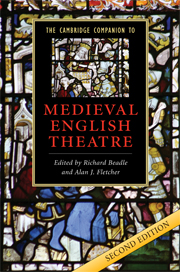Book contents
- Frontmatter
- 1 An introduction to medieval English theatre
- 2 The theatricality of medieval English plays
- 3 The cultural work of early drama
- 4 The York Corpus Christi Play
- 5 The Chester cycle
- 6 The Towneley pageants
- 7 The N-Town plays
- 8 The non-cycle plays and the East Anglian tradition
- 9 Morality plays
- 10 Saints and miracles
- 11 Modern productions of medieval English drama
- 12 A guide to criticism of medieval English theatre
- Select bibliography
- Author index to the bibliography
- General index
7 - The N-Town plays
Published online by Cambridge University Press: 28 November 2011
- Frontmatter
- 1 An introduction to medieval English theatre
- 2 The theatricality of medieval English plays
- 3 The cultural work of early drama
- 4 The York Corpus Christi Play
- 5 The Chester cycle
- 6 The Towneley pageants
- 7 The N-Town plays
- 8 The non-cycle plays and the East Anglian tradition
- 9 Morality plays
- 10 Saints and miracles
- 11 Modern productions of medieval English drama
- 12 A guide to criticism of medieval English theatre
- Select bibliography
- Author index to the bibliography
- General index
Summary
As research advances, the old familiar and traditional boxes in which critics have tried to contain the resisting diversity of much late medieval English drama have come to look increasingly unequal to the task. Terms like ‘Corpus Christi plays’ or ‘cycle plays’, once thought useful generic labels, now seem less so. Of course, the perceived need for such pigeon-holing has a long pedigree. Whoever wrote ‘The plaie called Corpus Christi’ on the first page of the play manuscript that concerns this chapter, British Library MS Cotton Vespasian D. viii, is the earliest known member of this critical family tree. He would hardly have foreseen that his sixteenth-century attempt to sum up the plays in front of him and reduce them to a generic order that he at least found satisfactory would have provided the title for one of the most successful studies of medieval drama in recent years, a study whose equally unforeseen consequence has been the perpetuation of some homogenised ways of thinking about what a ‘Corpus Christi cycle’ might be thought to be (168). The fact is, however, that the plays of Cotton Vespasian D. viii are not tidily compliant, and resist the totalising, one-size-fits-all project that the idea of a ‘Corpus Christi cycle’ has over the years risked becoming. Their resistance strikes at a number of the most basic of the old assumptions. There is no evidence that these plays ever had anything to do with Corpus Christi, at least not in the most fundamental sense of their having been performed then; on the contrary, some were originally intended for performance on a Sunday.
- Type
- Chapter
- Information
- The Cambridge Companion to Medieval English Theatre , pp. 183 - 210Publisher: Cambridge University PressPrint publication year: 2008
- 1
- Cited by

